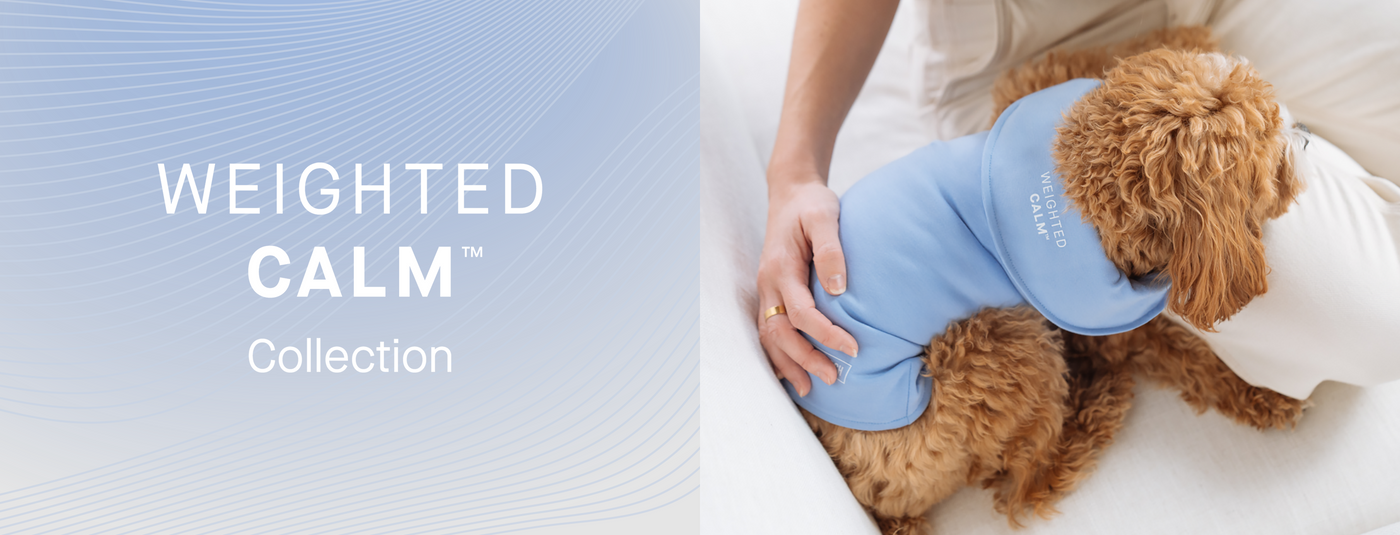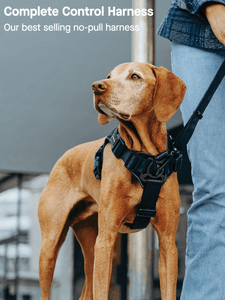Return to Blog
Weighted Calm™ Solutions for Anxious Dogs
By Canada Pooch on May 12, 2023

What is dog anxiety?
Anxiety is an emotional reaction both people and animals have when anticipating a scary or fearful event. For example, if a person has a painful or otherwise unpleasant experience at the dentist's office, the next time they go to the dentist, they will likely feel some level of anxiety. The same is true for dogs and other pets. If they have had a painful or scary experience at a veterinary clinic, they are likely to experience anxiety and fear the next time. For some dogs, this starts in the car or once they arrive. For other dogs, they will be triggered when they are taken away from the pet parent for a test or procedure. Fear is a more intense negative emotion and is defined as the emotion animals feel in the moment when facing a fearful circumstance. O or thunder, or maybe when greeting new people or dogs. Anxiety and fear can also occur during car rides and visiting new places.
Ways to identify dog anxiety: Does my dog experience it?
It can be difficult to identify anxiety and fear in a dog if a pet parent isn’t familiar with how dogs communicate. Since dogs are nonverbal, they show how they feel with their body. When a dog starts to feel anxious, they show mild signs of anxiety; they might hold their ears back, have “whale eyes,” lick their lips when they haven’t been eating, look away or be very vigilant and look around everywhere quickly or have a tucked-up tail. In English, this would translate to: “I am anxious or worried about what will happen next.” This can escalate to a dog that growls. A dog growl is frequently mistaken as a sign of a “bad dog” when in fact, it is the dog communicating; “PLEASE, increase the distance between us. I am scared!”. This can be hard to believe, especially when a large dog is growling, and we see big teeth and hear a loud scary noise. But these are the tools a dog has been given to tell us that they feel scared.
How does weight work to calm an anxious dog? Human research has shown that weighted blankets and the effects of pressure can help reduce anxiety. These positive emotional regulating effects are believed to occur through sensory modulation, promoting a decrease in the stress hormone cortisol, and some other neurotransmitters. Deep tissue pressure can be a form of sensory modulation. In situations that cause stress and anxiety, sensory modulation has been shown effective in letting children re-direct their attention from something that they see or hear that is bothering them and focus more on the sense of touch. This sensory modulation can also be effective in regulating a dog’s emotional state similarly by contributing to a lower heart rate and giving the body an overall calm and peaceful feeling.
How do I introduce these products to my dog?
If you want to set your pup up for success, introduce anything new or different slowly. Be careful not to grab your pet out of the blue and expect complete acceptance right off the bat. There are definitely some dogs who are fine when new things are introduced. But some dogs are not. This doesn’t mean that it can’t be done! If your dog is more skittish, which is essentially a sign of anxiety, then take some time to associate the vest or blanket with something that you are sure your dog likes. For maximum positive associations, feed a treat for a well-known “sit and shake a paw” command. Verbal praise and calm music playing in the background are also great ideas, but nothing trumps the treat! When they feel good and positive, this emotional state will be associated with the vest or blanket. And the effects are long-lasting!
What are the benefits of weighted products?
Pet parents are more than ever informed about their pet’s needs and are asking if there are ways to help their pets with anxiety naturally and safely. Weighted blankets and vests can be excellent starting points- there are no adverse effects, and they are very safe.
The Weighted Calming Vest is great for dogs that generally experience anxiety daily and for dogs that are anxious in specific situations. It’s common for dogs to experience anxiety with loud noises like thunderstorms, fireworks, or nearby construction. The Calming vest would also benefit any dog that feels anxious outside the home for car rides, walks, vet visits, and training classes.
Written by Dr. Collen Wilson
Dr. Colleen Wilson, Diplomate, American College of Veterinary Behaviorist. A Veterinary Behaviorist is a veterinarian that has achieved board certification in the specialty of veterinary behavior; only 8 people in Canada with this status and 75 in the USA hold this certification. Dr. Wilson was a consultant throughout product development and user testing of the Calming Collection.


